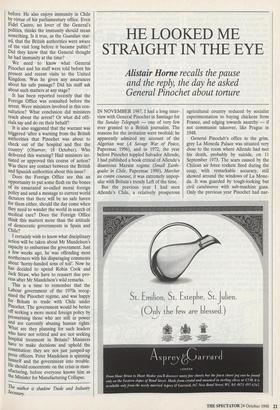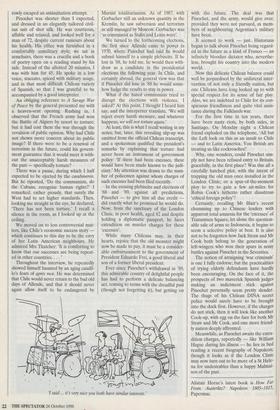HE LOOKED ME STRAIGHT IN THE EYE
Alistair Home recalls the pause
and the reply, the day he asked General Pinochet about torture
IN NOVEMBER 1987, I had a long inter- view with General Pinochet in Santiago for the Sunday Telegraph — one of very few ever granted to a British journalist. The reasons for the invitation were twofold; he apparently admired my account of the Algerian war (A Savage War of Peace, Papermac 1996), and in 1972, the year before Pinochet toppled Salvador Allende, I had published a book critical of Allende's disastrous Marxist regime (Small Earth- quake in Chile, Papermac 1990). Marcher au contre courant, it was extremely unpop- ular with Britain's trendy Left of the time.
But the previous year I had seen Allende's Chile, a relatively prosperous agricultural country reduced by socialist experimentation to buying chickens from France, and edging towards anarchy — if not communist takeover, like Prague in 1948.
General Pinochdes office in the grim, grey La Moneda Palace was situated very close to the room where Allende had met his death, probably by suicide, on 11 September 1973. The scars caused by the Chilean air force rockets fired during the coup, with remarkable accuracy, still showed around the windows of La Mone- da. It was guarded by tough-looking but civil carabineros with sub-machine guns. Only the previous year Pinochet had nar- rowly escaped an assassination attempt.
Pinochet was shorter than I expected, and dressed in an elegantly tailored civil- ian suit of shot silk. He was courteous, affable and relaxed, and looked well for a man of 72, despite current rumours about his health. His office was furnished in a comfortably unmilitary style; we sat in armchairs, there was a crucifix and a book of poetry open on a reading stand by his side. Instead of the allotted 20 minutes, I was with him for 45. He spoke in a low voice, staccato, spiced with military usage, and in that most difficult Chilean variety of Spanish, so that I was grateful to be accompanied by a good interpreter.
An obliging reference to A Savage War of Peace by the general presented me with a heaven-sent opening. Rushing in, I observed that the French army had won the Battle of Algiers by resort to torture; but it had cost them the war through the revulsion of public opinion. Why had Chile not shown more concern about its public image? If there were to be a renewal of terrorism in the future, could his govern- ment guarantee that it would meet it with- out the unacceptably harsh measures of the past — specifically torture?
There was a pause, during which I half expected to be ejected by the carabineros. But he riposted, `Do the communists, do the Cubans, recognise human rights?' I remarked, rather piously, that surely the West had to set higher standards. Then, looking me straight in the eye, he declared, 'There has not been torture.' I recall a silence in the room, as I looked up at the ceiling.
We moved on to less controversial mat- ters, like Chile's economic success story — which continues to this day to be the envy of her Latin American neighbours. He admired Mrs Thatcher: 'It is comforting to know that our successes are being repeat- ed in other countries.. . . '
Throughout the interview, he repeatedly showed himself haunted by an aging caudil- lo's fears of apres moi. He was determined that Chile would never return to the bad old days of Allende, and that it should never again allow itself to be endangered by Marxist totalitarianism. As of 1987, with Gorbachev still an unknown quantity in the Kremlin, he saw subversion and terrorism as still managed by Moscow. Gorbachev was 'as communist as Stalin and Lenin were'.
We turned to the forthcoming elections, the first since Allende came to power in 1970, where Pinochet had said he would submit himself to a simple plebiscite. If he lost in '88, he told me, he would then with- draw as a candidate in the presidential elections the following year. In Chile, and certainly abroad, the general view was that if Pinochet did lose in '88 he would some- how fudge .the results to stay in power.
What if the hated communists tried to disrupt the elections with violence, I asked? At this point, I thought I heard him say, and the interpreter translate, 'We will reject every harsh measure, and whatever happens, we will not torture again.'
At least, this is what I recall writing in my notes; but, later, this revealing slip-up was omitted from the official Chilean transcript, and a spokesman qualified the president's remarks by explaining that torture had never been an instrument of government policy: 'If there had been excesses, these would have been made known to the judi- ciary.' My attention was drawn to the num- ber of policemen against whom charges of such excesses had been filed recently.
In the ensuing plebiscite and elections of '88 and '89, against all predictions, Pinochet — to give him all due credit — did exactly what he promised he would do. Now, from the sanctuary of the London Clinic, in poor health, aged 82 and despite holding a diplomatic passport, he faces extradition on murder charges for these 'excesses'.
While many Chileans may, in their hearts, rejoice that the old monster might now be made to pay, it must be a consider- able embarrassment to the government of President Eduardo Frei, a good liberal and son of a former liberal president.
Ever since Pinochet's withdrawal in '89, this admirable country of delightful people has had to perform a delicate balancing act, coming to terms with the dreadful past (though not forgetting it), but getting on 'I said ... it's vet), nice you both have similar interests.' with the future. The deal was that Pinochet, and the army, would give over, provided they were not pursued, as mem- bers of neighbouring Argentina's military have been.
It seemed to work — just. Historians began to talk about Pinochet being regard- ed in the future as a kind of Franco — an infinitely bloodier dictator who, neverthe- less, brought his country into the modern world.
Now this delicate Chilean balance could well be jeopardised by the unilateral inter- vention of not only a friendly nation, but one Chileans have long looked up to with special respect for its sense of fair play. Also, we are indebted to Chile for its con- spicuous friendliness and quite vital assis- tance during the Falklands war.
For the first time in ten years, there have been nasty riots, by both sides, in Santiago. On Monday night a Chilean friend exploded on the telephone, 'All but the Left look on this as an insult to Chile — and to Latin America. You British are treating us like cockroaches!'
Why, one wonders, could Pinochet sim- ply not have been refused entry to Britain, gracefully, in the first place? Was this all a carefully hatched plot, with the intent of trapping the old man once installed in the London Clinic; or a spur-of-the-moment ploy to try to gain a few air-miles for Robin Cook's hitherto rather disastrous 'ethical foreign policy'?
Certainly, recalling Mr Blair's recent chumming up to Chinese leaders with apparent total amnesia for the 'excesses' of Tiananmen Square, let alone the question- able sale of arms to Indonesia, it begins to seem a selective policy at best. It is also not to be forgotten how Jack Straw and Mr Cook both belong to the generation of left-wingers who won their spurs in noisy battles against Pinochet in the Seventies.
The notion of arraigning 'war criminals' is one I fully endorse; but the practicalities of trying elderly defendants have hardly been encouraging. On the face of it, the prospects of two maverick Spanish judges making an indictment stick against Pinochet personally seem pretty slender. The thugs of his Chilean DINA secret police would surely have to be brought into the dock first. However, if the charges do not stick, then it will look like another Cook-up, with egg on the face for both Mr Straw and Mr Cook, and one more friend- ly nation deeply affronted.
Meanwhile, as Pinochet awaits the extra- dition charges, reportedly — like William Hague during his illness — he lies in bed reading a recent biography of Napoleon; though it looks as if the London Clinic may now turn out to be more of a St Hele- na for undesirables than a happy Malmai- son of the past.
Alistair Home's latest book is How Far From Austerlitz? Napoleon 1805-1815, Papermac.



















































































 Previous page
Previous page